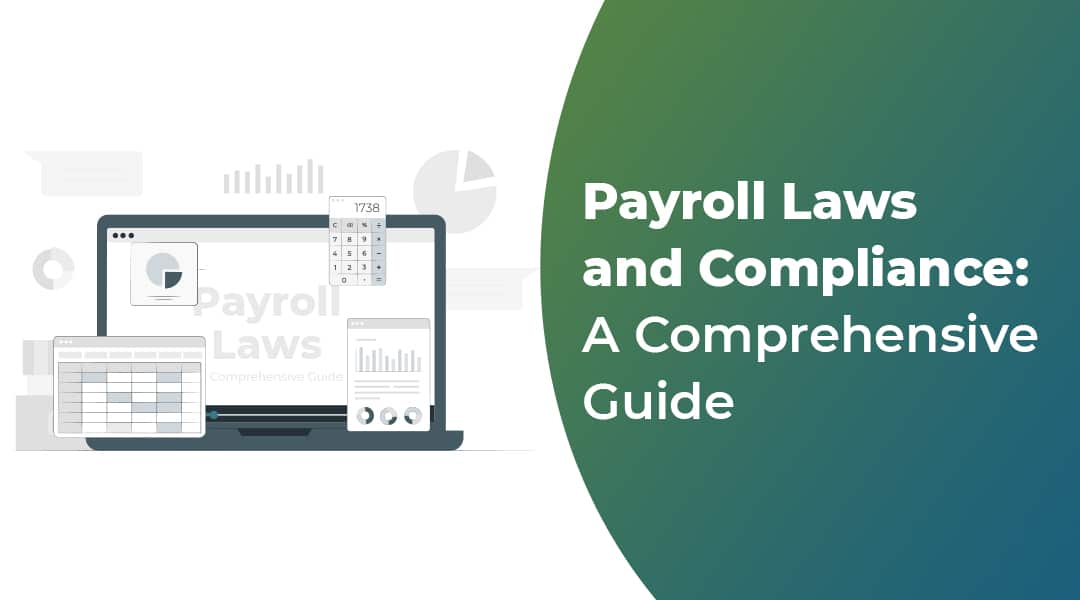Payroll management is a crucial part of running a business, and it involves much more than just paying employees. To ensure fairness and legality, it’s important for employers to understand and follow the various payroll laws and regulations.
Managing payroll is like navigating a complex maze. It’s not as simple as handing out paychecks; there are rules and regulations to follow. Complying with these laws is not only necessary to avoid legal trouble but also crucial for maintaining fairness and ethical practices within the organization. This guide aims to simplify the world of payroll laws and compliance, providing businesses with the knowledge and tools they need to ensure smooth operations and stay on the right side of the law. This comprehensive guide provides an overview of payroll laws and compliance in India, outlining key considerations and best practices for businesses.
1. Classification of Employees
Properly classifying employees is crucial for complying with Indian payroll laws. Employees in India can be categorized into different types based on factors such as their job roles, responsibilities, and remuneration structure. The classification may include regular employees, contract workers, consultants, and trainees, among others. Each category may have specific payroll-related considerations and legal obligations.
To ensure payroll compliance in India with respect to Indian laws, it is important to understand the various employee classifications. Here are key points to consider:
-
Regular Employees
- Regular employees refer to individuals who have a direct employment relationship with the organization.
- They may be classified further based on factors such as their designation, level, and position within the company.
- Regular employees are entitled to benefits such as provident fund contributions, gratuity, and other statutory benefits as mandated by Indian labour laws.
-
Contract Workers
- Contract workers are individuals hired on a temporary or fixed-term contract basis to fulfil specific tasks or projects.
- These workers may be engaged through third-party staffing agencies or directly by the company.
- Compliance with labour laws, contract terms, and payment of wages in a timely manner are important considerations for managing payroll for contract workers.
-
Consultants
- Consultants are typically engaged for their specialized expertise or services on a contractual basis.
- They may be self-employed or work as part of a consultancy firm. Payment terms, taxation rules, and compliance with contractual agreements are vital aspects to consider when managing payroll for consultants.
-
Trainees and Apprentices
- Trainees and apprentices are individuals undergoing training or apprenticeship programs within the organization.
- Payroll compliance for trainees and apprentices may involve adherence to minimum wage requirements, training allowances, and applicable labour laws.
2. Minimum Wage Requirements
Payroll compliance in India involves adhering to minimum wage laws set by federal, state, and local authorities. Employers must ensure that employees are paid at least the minimum wage for all hours worked. In cases where federal and state minimum wages differ, the higher rate must be applied. Regular reviews and updates are necessary to stay informed about any changes in minimum wage laws.
Minimum wage laws in India vary based on the industry, location, and type of employment. Here are key points to consider when it comes to minimum wage requirements in India:
-
Applicability of Minimum Wage
- The Minimum Wages Act, of 1948, governs the minimum wage requirements in India.
- The act applies to various sectors and industries, such as manufacturing, construction, retail, hospitality, and more.
- Each state in India has its own scheduled employment categories and minimum wage rates, which are periodically revised.
-
Factors Determining Minimum Wages
- Minimum wages in India are determined based on factors such as skill level, geographical location, nature of work, and the cost of living.
- The minimum wage rates may vary for different job categories within an industry or sector.
-
Compliance Obligations for Employers
- Employers are responsible for ensuring that their employees receive wages that meet or exceed the applicable minimum wage rates.
- The wages must be paid in a timely manner, typically on a monthly basis, and in the prescribed mode (cash, bank transfer or other permissible methods).
- Employers must maintain accurate records of wages paid, including details such as hours worked, deductions, and overtime, to demonstrate compliance with minimum wage laws.
-
Regular Review and Updates
- Minimum wage rates are subject to periodic revisions by the respective state governments and central government as well.
- Employers should stay informed about any changes in minimum wage rates through official government notifications or circulars.
- Regular review of wage structures and timely adjustments should be made to ensure compliance with updated minimum wage laws.
Complying with minimum wage requirements is not only a legal obligation but also essential for promoting fair and equitable employment practices in India. Employers must understand the minimum wage laws applicable to their industry and location and ensure proper record-keeping to demonstrate compliance with these regulations.
3. Overtime Pay
In the Indian context, overtime pay is governed by the provisions of the applicable labour laws, such as the Factories Act, of 1948, the Shops and Establishments Act of respective states, and industry-specific regulations. Understanding the regulations surrounding overtime pay is crucial to ensure compliance and fair treatment of employees. Here’s an overview of overtime pay in India:
-
Overtime Eligibility
- Overtime pay generally applies to non-exempt employees who work beyond the standard working hours defined by the relevant labour laws or employment agreements.
- The exact criteria for overtime eligibility may vary based on the industry, state-specific regulations, and employment agreements.
-
Calculation of Overtime Pay
- The calculation of overtime pay in India depends on factors such as the total hours worked beyond the regular working hours and the applicable wage rates.
- Generally, employees are entitled to receive overtime compensation at a higher rate, often 1.5 or 2 times their regular hourly wage.
- Some industries or establishments may have specific rules regarding the calculation of overtime pay, such as a fixed overtime rate or different rates for different categories of employees.
-
Maximum Hours of Work
- Labour laws in India specify the maximum number of hours an employee can work in a day or a week.
- For example, the Factories Act, of 1948, restricts working hours to 9 hours a day and 48 hours a week, with provisions for overtime beyond these limits.
- The specific working hour limits may vary based on the industry, state, and nature of work.
-
Record-keeping and Documentation
- Employers are required to maintain accurate records of employee work hours, including overtime hours worked.
- Proper documentation is essential to demonstrate compliance with overtime regulations, resolve disputes, and calculate accurate overtime pay.
-
Compliance and Legal Consequences
- Non-compliance with overtime regulations can result in penalties, legal consequences, and damage to the employer’s reputation.
- Employers must ensure that accurate records of overtime hours worked and corresponding compensation are maintained to mitigate the risk of non-compliance.
4. Payroll Taxes
Payroll taxes are deductions and contributions that employers withhold from employee wages and remit to tax authorities. These taxes include income tax, social security, and other mandated contributions. Complying with payroll tax obligations is crucial for businesses to meet legal requirements and ensure accurate financial management. Employers play a vital role in calculating, withholding, and remitting payroll taxes, while employees are impacted through income tax deductions and eligibility for social security benefits. Understanding and effectively managing payroll taxes is essential for businesses to fulfil their obligations, maintain employee satisfaction, and contribute to government programs and social welfare initiatives.
-
Income Tax Deductions
- Employers are required to deduct income tax from the salaries of employees based on the income tax slab rates and other applicable provisions.
- The income tax deduction is calculated based on the employee’s declared investments, deductions, and income projections for the financial year.
- Employers must ensure accurate calculation of income tax and timely deposit of the deducted amount to the Income Tax Department.
-
Provident Fund Contributions
- Employers are obligated to contribute to the Employees’ Provident Fund (EPF) for eligible employees. The EPF is a retirement savings scheme governed by the Employees’ Provident Fund and Miscellaneous Provisions Act,1952.
- Employers deduct a certain percentage of the employee’s salary towards the EPF and contribute an equal amount.
- The EPF contributions must be deposited within the specified due dates and the applicable contribution rates as per the EPF Act.
-
Professional Tax
- Professional tax is a state-level tax imposed on salaried employees by some Indian states.
- Employers are responsible for deducting professional tax from employees’ salaries and remitting it to the respective state tax authorities.
- The professional tax rates and thresholds may vary from state to state, and compliance requirements should be adhered to accordingly.
-
Social Security Contributions
- Employers are required to contribute to social security schemes such as the Employees’ State Insurance (ESI) scheme and the National Pension System (NPS).
- The ESI scheme provides health insurance and medical benefits for employees, while the NPS is a contributory pension scheme.
- Employers must deduct the applicable contributions from employees’ salaries and remit them to the respective authorities within the specified timelines.
-
Compliance and Reporting
- Employers must ensure accurate calculation and deduction of payroll taxes, as well as timely remittance to the respective tax authorities.
- Maintaining proper records, filing periodic tax returns, and complying with other reporting requirements are crucial for payroll tax compliance in India.
5. Record-Keeping and Reporting
Maintaining accurate and detailed payroll records is a fundamental aspect of payroll compliance. Employers must keep records of employee information, hours worked, wages paid, tax withholdings, and other relevant payroll data. These records should be retained for a specific period as required by federal and state laws. Accurate reporting of payroll information to tax authorities, such as filing quarterly and annual payroll tax returns, is also crucial for compliance.
-
Payroll Records
- Employers are responsible for maintaining accurate and detailed payroll records for each employee. These records typically include personal information, such as name, address, Social Security number, and employment details.
- Additionally, payroll records should include information on hours worked, wages paid, tax withholdings, deductions, benefits, and any other relevant payroll data.
- It is important to retain payroll records for a specific period as required by federal and state laws. The retention period may vary, but it is generally recommended to retain records for at least three to seven years.
-
Documentation and Audits
- Accurate record-keeping and compliance reporting help in case of audits or inquiries by tax authorities. Employers must be able to provide supporting documentation to validate the reported payroll information.
- Maintaining organized and accessible records streamlines the audit process and demonstrates the employer’s commitment to payroll compliance.
-
Payroll Software and Systems
- Utilizing payroll software or systems can greatly assist in record-keeping and reporting. These tools automate calculations, generate reports, and help ensure accuracy and compliance with payroll tax regulations.
- Payroll software can integrate with timekeeping systems to track employee hours and facilitate accurate wage calculations. It can also automate the generation of payroll tax forms and assist with compliance reporting.
By maintaining accurate and organized payroll records, meeting reporting obligations, and utilizing payroll software or systems, employers can effectively manage payroll compliance. This not only ensures adherence to legal requirements but also provides a foundation for smooth audits, inquiries, and overall financial management.
6. Compliance with Benefits and Deductions
Employers must comply with laws related to employee benefits and deductions, such as health insurance, retirement plans, and wage garnishments. It is essential to understand and adhere to applicable laws, when providing benefits and processing deductions.
-
Employee Benefits
- In India, employers may provide various employee benefits, such as health insurance, provident fund contributions, and gratuity payments.
- Compliance with laws such as the Employees’ State Insurance (ESI) Act and the Employees’ Provident Fund and Miscellaneous Provisions (EPF) Act is crucial when offering these benefits.
- Employers must accurately calculate and deduct the required contributions from employee salaries and remit them to the respective authorities within specified timelines.
-
Retirement Plans
- Employers may offer retirement plans, such as the National Pension System (NPS) or other approved pension schemes, to ensure financial security for employees after their working years.
- Compliance with pension regulations, including timely contributions and adherence to investment guidelines, is essential for employers administering retirement plans.
- Employers should stay updated on any changes in pension regulations and communicate the details effectively to employees.
-
Wage Garnishments and Deductions
- Wage garnishments may arise due to court orders or legal requirements, such as income tax deductions and loan repayments.
- Employers must accurately calculate and deduct the specified amounts from employee salaries, ensuring compliance with applicable laws.
- It is important to communicate clearly with employees regarding any deductions made from their wages and maintain proper documentation for reference and auditing purposes.
-
Compliance with Labor Laws
- India has various labour laws, including the Employees’ State Insurance Act, the Employees’ Provident Fund and Miscellaneous Provisions Act, and the Payment of Bonus Act, among others.
- Employers must understand and comply with these laws when providing employee benefits, processing deductions, and ensuring fair labour practices.
- Staying updated on changes in labour laws and seeking professional advice or consulting with legal experts can help businesses navigate the complexities of compliance.
By adhering to laws and regulations governing employee benefits and deductions, employers demonstrate their commitment to fair and lawful practices.
7. Stay Updated with Changing Laws
Payroll laws and regulations are subject to changes and updates. It is essential for employers to stay informed about any amendments to federal, state, and local payroll laws that may affect their payroll processes. This can be done through regular monitoring of government websites, consulting with payroll professionals or legal experts, and participating in relevant industry associations.
Conclusion
Compliance with payroll laws according to Payroll Compliance in India is crucial for businesses to ensure fair treatment of employees, avoid legal issues, and maintain a positive work environment. By understanding and adhering to these laws, businesses can effectively manage their payroll processes and mitigate compliance risks, promoting trust and stability within their workforce. You can become an expert in payroll laws and compliance by learning from finance experts at GGC’s Practical Training Academy, a comprehensive online finance course for accounting and finance. Not just that, you can learn about more complex topics like payroll processing easily.




